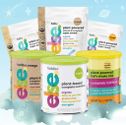When to Start Supplementing with Formula
Discover how to create a balanced feeding plan that supports both mom and baby, ensuring healthy growth and bonding experiences when supplementing with formula
Published July 26, 2024

For many women, the decision to exclusively or partially breastfeed is made before giving birth. For others, that decision may come a few weeks or months into their breastfeeding journey, and for some new moms, the choice may not be theirs to make due to medical reasons.
In any situation though, the human milk versus formula decision you make does not need to be an all-or-nothing stance. And it should definitely never cause guilt or shame for any mother. There is most certainly an acceptable and safe middle ground that accommodates a combination of breast milk with a formula that provides benefits for both mom and baby. This is called supplementing.
» Discover organic, plant-powered nutrition for healthy growth
Why Supplement with Infant Formula?
- Your baby is not gaining (or is losing) weight. This could be due to not responding well to breast milk or because suckling is not yet perfected.
- Your baby is born jaundiced and needs extra hydration.
- The mom has a low milk supply.
- The mom or baby has medical concerns. The mom might be taking medication that is not safe for the baby when passed through breast milk. Premature babies are often bottle-fed because nursing burns too many calories they just can’t afford to burn.
- Multiples—If you have twins or triplets, you will need a very large supply of milk, and your body may not be able to produce enough. Plus, it will be extremely exhausting and time-consuming to feed multiple as you will constantly be nursing.
- The mother is returning to work or is uncomfortable breastfeeding and/or pumping in public.
- Your partner or other family members want to share in the experience and develop bonds with the baby.
Regardless of your reason, it’s going to be an adjustment, but you and your baby are going to be just fine. Try to be patient and prepared to stumble a bit. There’s going to be a lot of trial and error in the process. A reminder that it is not a bad thing to need breast milk and formula. All you want is for your baby to be healthy.
If you feel that you are really struggling, you can look into booking a lactation consultant who can coach you through the correct thing to do, whether it's continuing to have a breastfed baby or switching to a bottle of formula. Your baby may need both.
» Learn more about effective strategies to stop breastfeeding
Best Time to Start the Formula Supplementation Process
While both the American Academy of Pediatrics and the World Health Organization recommend exclusively breastfeeding for the first six months of life, the need to supplement with formula may come earlier for some babies. In actuality, any amount of breast milk your baby receives is going to be extremely beneficial and provide him or her with plenty of antibodies and nutrients needed for a healthy growth trajectory.
In most cases, the best time to start supplementation is after 3-4 weeks of age. This allows the mother's milk supply to be firmly established and gives the baby adequate time to learn how to suckle and nurse efficiently. By this time, an occasional bottle won’t be disruptive to your routine.
Supplementing too early can reduce milk supply or cause nipple confusion, causing the baby to reject the breast altogether. So, how do you transition your baby from breast milk to formula?
» Here's how to start supplementing with formula at night
How to Start Supplementing
Teaching Bottle Feeding
Just as you had to teach your baby how to nurse, you’ll have to teach him or her how to eat from a bottle. It may take some trial and error to find the result that works for you and your infant and to learn how much formula to give when supplementing.
Some moms introduce a bottle containing their breast milk supply first, so once the baby gets past the different nipple, it also has to adjust to new food. This is a really effective way to start the process.
» Here's how to deal with a baby refusing a bottle
Finding the Right Nipple
Try to find a nipple that most closely replicates a breast so it might be more easily accepted. If your baby refuses, you might have to try a couple of different types, shapes, and varying flows of nipples, so don’t buy any bundle packs right from the start.
Transitioning to Formula
If the baby has adjusted to the bottle fairly well, your next step in introducing formula might be to let the baby nurse first and then finish (or top off) the feed with a bottle of powdered formula. He might not eat a lot of formula initially because he completely emptied your breast, but it’s an easy transition to get him used to the new taste and texture being introduced.
» Here's how to decide on toddler formula vs infant formula
Another option is a little more aggressive: You give up one nursing session a day and formula feed with a bottle.
To make this change smoothly, select a time during the day when the baby is usually the most content, happy, and alert. You can distract him with smiles and songs, and he may be more accepting of this new process. If you wait to try and give your baby a bottle when he is hungry, fussy, and angry (hangry!), there is likely to be more resistance and less success.
» Here are more tips on transitioning from breastmilk to formula
Incorporating Combination Feeding
Be sure to incorporate combination feeding or mixed feeding and gradually drop your nursing sessions one at a time so your milk production can respond accordingly without causing you problems with engorgement or other complications.
The least complicated and most successful approach is to add one formula feeding a day for a couple of days and then slowly increase until you reach either exclusive formula feeding or as many sessions as you choose. When you choose to supplement, you want to make sure your baby is getting enough milk. Combo feedings with formula and breast milk are not a bad thing as long as your child is eating enough.
» Discover more about baby nutrition and mixed feeding
Choosing a Formula
Of all the important decisions you have to make as a new parent, choosing the right formula for your baby should not be difficult or cause you any worry. There are a multitude of formulas for every possible need. As long as the protein base is the same, it is safe to switch between brands if the baby prefers one over another or if cost becomes a factor.
What's best for your child may not be the same as another; this is trial and error to help your baby. Depending on how your baby responds to the taste of formula, it might be beneficial to try more than one at first.
» Find out if your little one is ready to start solid foods
The Food and Drug Administration specifies that all infant formulas must contain a minimum amount of 29 important nutrients (and a maximum amount of 9 nutrients babies need less of). The FDA also states that it’s not necessary to fortify your baby’s diet with any vitamins or minerals when formula feeding.
» Explore the best formulas for mixed feeding
Once you decide to start adding formula to your baby’s diet, speak with his pediatrician first for recommendations on the type of formula that will best suit your baby’s needs.
Many doctors or hospitals will give you samples to try as well. Providing your baby does not have any food intolerances or allergies, it is recommended by the American Academy of Pediatrics to feed your baby an iron-fortified milk protein-based formula up until age one, when you might start transitioning to regular whole milk.
» Find out how much formula to give when supplementing
Food Intolerance and Formula
If your baby has an allergy to dairy or other food intolerance, or you notice symptoms that might be due to a food allergy, you’ll want to understand how to switch baby formulas. Additionally, your baby’s doctor might recommend a hypoallergenic formula or alternative protein-based formula.
Symptoms of allergies include redness, hives, rash, chronic diarrhea, blood in stool or vomit, or excessive fussiness. Do not switch formulas, though, until you consult with your doctor to determine if it is medically necessary. Switching protein bases unnecessarily or too quickly can be harmful to the baby and can affect the baby's stool.
» Here's all you need to know when choosing baby & toddler formula
Empowering Your Feeding Choice
Regardless of the reason you have chosen to begin supplementing with formula, rest assured it is safe and healthy to do so. A well-fed baby is a happy and healthy one. And if momma feels good about the choices she has made, your baby will thrive, too. So, don’t let the pressure of the mommy wars on breast vs formula feeding influence your decision. This choice is yours, and you know what is best for your precious new baby. Trust yourself and your instincts!
» Explore the best plant-based formulas for infants
The content and advice provided in this article are for informational purposes only and are not a substitute for medical diagnosis, treatment, or advice for specific medical conditions. Always consult a pediatrician to understand the individual needs of your child.










